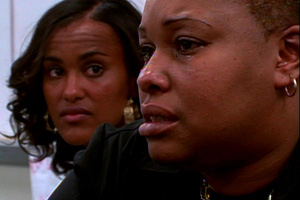(All of Us is playing in New York City at Cinema Village. Visit the film’s official website to watch a trailer and learn about upcoming screenings.)
On the surface, Emily Abt’s All of Us is about African-American women and their alarmingly high HIV infection rate, but at a certain point it crosses the poverty line to speak about sexual dynamics in a broader way. At the beginning of the documentary, many viewers—especially males—will be thinking, “This is all well and good, but it doesn’t pertain to me.” By the end, both males and females of every race will be forced to reevaluate the role sex plays in their own lives.
Abt’s window into this world is Dr. Mehret Mandefro, a motivated Ethiopian-American doctor in the South Bronx who wants to figure out why this demographic is at such a greater risk than any other. She finds two HIV-infected women who are willing to speak openly with her (and the camera). Chevelle used to trade rampant, unprotected sex for money and drugs. Tara’s heroin-addicted father took her virginity when she was five, and her mother prostituted her for decades. Sickened and heartbroken yet? How about this: to add injury to injury, Tara is also diagnosed with cervical cancer, and her current boyfriend doesn’t want to wait until she has time to heal from vaginal surgery before having sex with her again. She knows that he’ll get it from somewhere else, so she must swallow the pain and psychological fear to give him what he wants.
 This is truly tragic stuff, but what keeps All of Us feeling hopeful—or at least not completely hopeless—is the women themselves. Removing race from the equation, the positive, unwavering spirit exuded by Chevelle and Tara recalls Kimberly Rivers Roberts’ defiant presence in Trouble the Water. Or maybe we should get racial here, for these women do share many relevant traits: they are black, they are poor, and they have been verbally and physically abused for their entire lives. Watching Chevelle and Tara (and Kimberly) continue to smile and have faith considering their circumstances provides a humbling lesson for us all. Next time you want to complain about something, think about these women and shut up.
This is truly tragic stuff, but what keeps All of Us feeling hopeful—or at least not completely hopeless—is the women themselves. Removing race from the equation, the positive, unwavering spirit exuded by Chevelle and Tara recalls Kimberly Rivers Roberts’ defiant presence in Trouble the Water. Or maybe we should get racial here, for these women do share many relevant traits: they are black, they are poor, and they have been verbally and physically abused for their entire lives. Watching Chevelle and Tara (and Kimberly) continue to smile and have faith considering their circumstances provides a humbling lesson for us all. Next time you want to complain about something, think about these women and shut up.
Mehret begins pursuing her agenda as an outsider, but gradually she begins to realize that she’s just as guilty of being overpowered and controlled when it comes to her own sexual relations. At first, it might seem like bad taste for Abt to focus on the romantic life of this college-educated woman as she drives from patient to patient, but this parallel story line is integral to Abt’s multi-tiered agenda. When Mehret has the realization that she hasn’t exhibited the safest behavior herself, she organizes a “trust circle” with her friends and begins to understand that this isn’t merely a poverty issue; it’s a female issue.
As an educated male viewer, these scenes are revealing, for they bring the problem home in a direct way. There are certainly many who will see this film as a work of social feminism, but it is more than that. It really is about all of us, how we say one thing and do another, how we’re afraid to commit to one person, how we aren’t responsible sexually, how we hear only what we want to hear and block out the rest. That said, it’s also about the lower-class African-American population and how poverty is the direct cause of these problems. While Mehret doesn’t come up with an answer by the end of the film, her determination, as well as Abt’s humanism as a filmmaker, bring this subject into the spotlight in a much-needed way.
— Michael Tully











